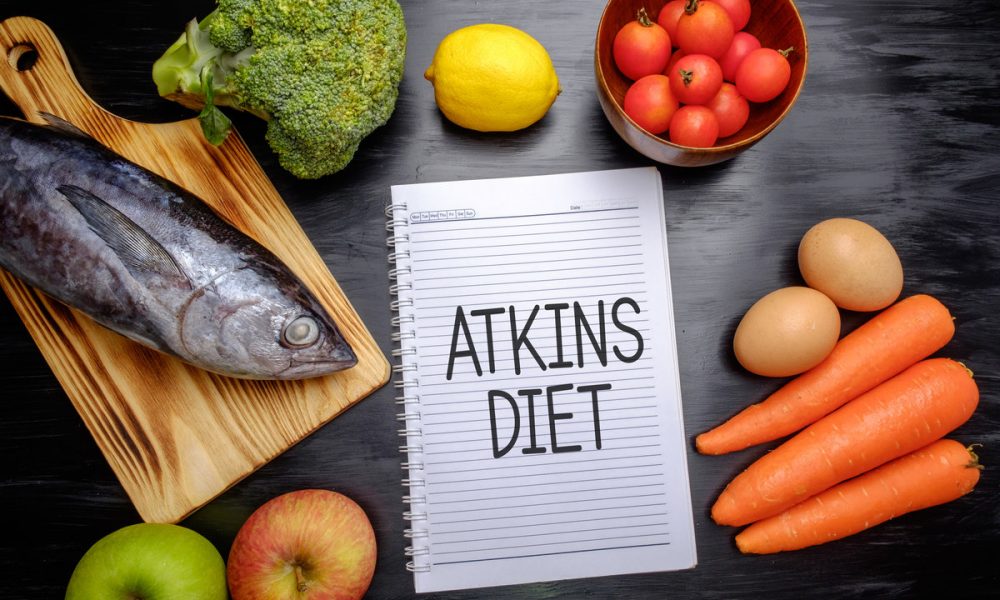ATKINS DIET
The Atkins diet is a low-carbohydrate eating plan that has gained popularity as a weight loss and health-promoting approach. Developed by Dr. Robert Atkins in the 1960s, this diet focuses on restricting carbohydrates while emphasizing protein and fat consumption. Unlike traditional diets that prioritize calorie counting, the Atkins diet aims to shift the body into a state of ketosis, where it primarily burns fat for fuel. By reducing carbohydrate intake, the diet aims to regulate blood sugar levels, promote weight loss, and improve overall health markers. The Atkins diet consists of several phases that gradually reintroduce carbohydrates based on individual needs and goals. In this discussion, we will explore the principles, potential benefits, and considerations of the Atkins diet to help you make an informed decision about whether it aligns with your health and lifestyle objectives.

ATKINS DIET- WHICH FOOD GROUPS TO USE
The Atkins diet emphasizes specific food groups and macronutrient ratios to achieve its goals. Here are the main food groups typically included in the Atkins diet plan:
- Protein: Protein-rich foods are a key component of the Atkins diet. These can include lean meats (such as chicken, turkey, beef, and pork), fish, eggs, and dairy products (like cheese and Greek yogurt). Adequate protein intake helps promote satiety, support muscle maintenance, and facilitate weight loss.
- Healthy Fats: The Atkins diet encourages the consumption of healthy fats, including sources such as avocados, nuts and seeds (such as almonds, walnuts, chia seeds, and flaxseeds), olive oil, coconut oil, and fatty fish (like salmon and sardines). These fats provide essential fatty acids, contribute to satiety, and help maintain ketosis.
- Non-starchy Vegetables: Non-starchy vegetables are a vital component of the Atkins diet, as they are low in carbohydrates and rich in fiber, vitamins, and minerals. Examples include leafy greens (such as spinach, kale, and lettuce), broccoli, cauliflower, zucchini, peppers, and asparagus. These vegetables provide important nutrients while keeping carbohydrate intake in check.
- Low-Glycemic Fruits: The Atkins diet allows for limited consumption of low-glycemic fruits, which are fruits that have a lower impact on blood sugar levels. Examples of low-glycemic fruits include berries (such as strawberries, raspberries, and blackberries) and small portions of other fruits like apples, pears, and citrus fruits.
- Dairy Products: Moderate amounts of dairy products are permitted in the Atkins diet, particularly those that are low in carbohydrates. This includes options like full-fat cheese, Greek yogurt, and heavy cream. However, it’s important to be mindful of portion sizes and choose products without added sugars.
- Nuts and Seeds: Nuts and seeds are a source of healthy fats, fiber, and essential nutrients. Options such as almonds, walnuts, chia seeds, flaxseeds, and pumpkin seeds can be included in the Atkins diet in moderation.
The Atkins diet restricts or limits foods high in carbohydrates, such as grains, bread, pasta, starchy vegetables, sugary foods, and beverages. The specific phase of the diet determines the extent of carbohydrate restriction, with some phases allowing for gradual reintroduction of carbohydrates.
It’s essential to note that individual needs, preferences, and health considerations may vary. Consulting with a healthcare professional or registered dietitian can provide personalized guidance and help tailor the Atkins diet plan to your specific goals and requirements.

ATKINS DIET- NEGATIVE SIDE EFFECTS
While the Atkins diet may have potential benefits for some individuals, it’s important to be aware of possible negative effects or drawbacks. Here are some commonly reported negative effects of the Atkins diet:
- Nutrient Deficiencies: Restricting or eliminating certain food groups, such as whole grains and fruits, may lead to inadequate intake of essential vitamins, minerals, and fiber. It’s important to ensure adequate nutrient intake through careful food choices and potential supplementation.
- Ketosis Side Effects: The induction of ketosis, which is a central aspect of the Atkins diet, may cause side effects known as “keto flu.” These can include fatigue, headache, constipation, bad breath, and brain fog during the initial stages of the diet.
- Difficulty Sustaining Long-Term: The strict nature of the Atkins diet, particularly in the initial phases, can make it challenging to sustain over the long term. The limited food choices and potential social and lifestyle restrictions may lead to difficulties adhering to the diet plan consistently.
- Potential Muscle Loss: In certain cases, the low carbohydrate intake of the Atkins diet may lead to muscle loss, especially if protein intake is inadequate. It’s important to consume sufficient protein from quality sources and monitor muscle health.
- Increased Risk of Heart Disease: The high intake of saturated fats, commonly found in foods permitted on the Atkins diet, may raise cholesterol levels and potentially increase the risk of heart disease. It’s advisable to choose healthier fats, such as monounsaturated and polyunsaturated fats, and prioritize quality sources of protein.
- Constipation and Digestive Issues: The reduced fiber intake from restricted carbohydrate sources can contribute to constipation and digestive issues. Ensuring adequate hydration and incorporating fiber-rich foods and supplements may help alleviate these issues.
- Potential Nutritional Imbalances: Without proper planning and monitoring, the Atkins diet may result in an imbalance of macronutrients, leading to overconsumption of unhealthy fats and inadequate intake of important vitamins, minerals, and antioxidants.
- Individual Variability: Not everyone responds the same way to the Atkins diet. Some individuals may experience negative effects on blood lipid profiles, kidney function, or overall health markers. It’s important to monitor your health and consult with a healthcare professional or registered dietitian for personalized guidance.
It’s crucial to consider your unique health situation, goals, and preferences before starting any diet plan. Consulting with a healthcare professional or registered dietitian can provide valuable insights and help determine if the Atkins diet is suitable for you while minimizing potential negative effects.
DIETS
Keto diet
Paleo diet
Cambridge diet
Diabetic diet
MEALS
Plant-based
Meat meals
Carbs meals
Diabetic meals
HEALTH
Benefits
Blood pressure
Reverse diabetes
Nutrition
EXTRAS
News
Blog
About Us
Contact Us

